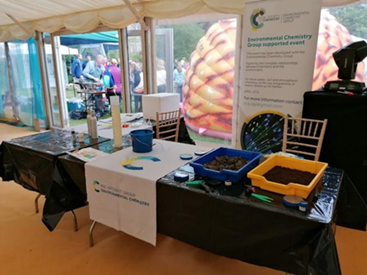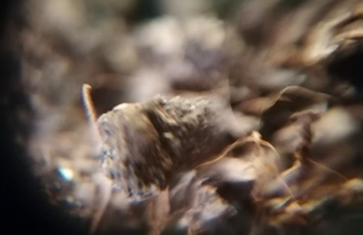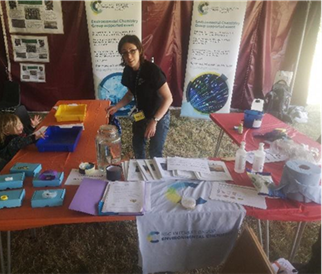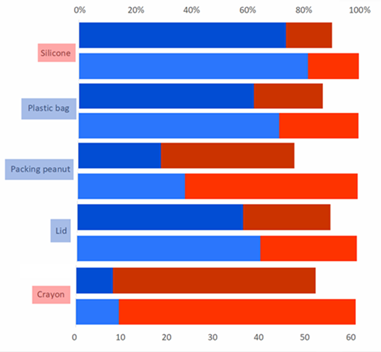Three outreach updates
In the spring and summer of 2022, the ECG participated in two outdoor science festivals. We report on these two festivals and on initiatives to engage the next generation with the environmental sciences.
Dorchester Science Festival
|
On Monday 2nd May, the ECG ran an outreach activity table at the Dorchester Science Festival, a small local festival (https://dorchesterfestival.com) with a science afternoon on the bank holiday Monday. With the luck of sunshine and the stunning venue of Dorchester Abbey, it was an extremely well-organised entirely volunteer-led event.
Dorchester Science Festival raises money for Daybreak, a charity that provides activities and support for people living with dementia. Besides the ECG, it featured a Bright Sparks science show, the UK Atomic Energy Authority, bell ringing, and a vicar walking on custard. |
During the day, we saw ~100 quality interactions with the stall. Three activities were on offer, including our dry ice ocean acidification demo, where we use colour changes, alongside effervescence and clouds, to illustrate how CO2 is changing our oceans – rapidly. An outline of this activity may be found in the July 2019 Bulletin, p. 22 (1). A stunning visual demonstration, it is always popular, and children enjoy touching the “steam” coming off the top.
|
For those who wished to get hands on, we also ran our hunting for microplastics (July 2018 Bulletin p. 22 (2)) and testing river water to distinguish Oxford and Peak District samples. Framed as detective challenges, these are engaging table-end practicals.
|
Investing in the future of science: A UK environmental science engagement
A Natural Environment Research Council-funded study has identified UK institutions (mainly universities) which participate in outreach projects to engage school-aged children with the environmental sciences (3). A Royal Society of Chemistry initiative has focused on children’s involvement with environmental sciences online during the Covid-19 pandemic (4). Some of the outreach projects which emerged from these two studies were tested in the Oxfordshire science festival reported below.
Findings from the primary study showed that most providers of environmental science outreach operated locally, visiting a small number of schools a few times a year, and aimed to expand to wider geographies and larger numbers of students in future. Funding was highlighted as a barrier to achieving this. Most projects were practical and in person, operating during school time: very little was online.
The additional study is assessing the changes in environmental science outreach activities during lockdowns and afterwards. Following a survey of providers, researchers are identifying the rapid adaptations that took this hands-on science off the field and onto the web. Of particular interest is whether expanding geography and numbers of pupils remain key aims, or whether targets shifted along with social changes. A greater move to online engagement has already been demonstrated, as well as changes to where and when activities take place.
Outputs of this study included a suite of online resources to support teachers and parents teaching environmental chemistry at home. Based on in-person activities discussed in ECG Bulletin July 2020 (5), Minecraft activities from Science Hunters provides a series of construction-themed challenges. In my capacity as an independent science communicator, I also prepared several activity sheets for Early Years (under 5 years) to Key Stage 5 (16-18 years). These activities include making bee balls, designing plastics for reuse, investigating plastic types according to floatation in water, and analysing solar energy data. The full list may be found on the study website (4).
Findings from the primary study showed that most providers of environmental science outreach operated locally, visiting a small number of schools a few times a year, and aimed to expand to wider geographies and larger numbers of students in future. Funding was highlighted as a barrier to achieving this. Most projects were practical and in person, operating during school time: very little was online.
The additional study is assessing the changes in environmental science outreach activities during lockdowns and afterwards. Following a survey of providers, researchers are identifying the rapid adaptations that took this hands-on science off the field and onto the web. Of particular interest is whether expanding geography and numbers of pupils remain key aims, or whether targets shifted along with social changes. A greater move to online engagement has already been demonstrated, as well as changes to where and when activities take place.
Outputs of this study included a suite of online resources to support teachers and parents teaching environmental chemistry at home. Based on in-person activities discussed in ECG Bulletin July 2020 (5), Minecraft activities from Science Hunters provides a series of construction-themed challenges. In my capacity as an independent science communicator, I also prepared several activity sheets for Early Years (under 5 years) to Key Stage 5 (16-18 years). These activities include making bee balls, designing plastics for reuse, investigating plastic types according to floatation in water, and analysing solar energy data. The full list may be found on the study website (4).
ATOM Festival of Science and Technology
On Friday 3rd June, the ECG ran an outreach activity table at the Abingdon-on-Thames ATOM Science and Technology Festival (https://www.atomfestival.org.uk/) a three-week science festival that aims to unite partner schools and build local science capital. Activities were held in a tent in a field; the weather proved good and the event, which also included food stalls and sellers, was well attended.
This Oxfordshire festival saw many of the same science providers as the Dorchester Science Festival, with additional appearances including from Nuffield Department of Medicine, University of Oxford, and various local schools. Chemistry was taught using virtual reality, and younger children were able to immerse themselves inside a giant bubble.
This Oxfordshire festival saw many of the same science providers as the Dorchester Science Festival, with additional appearances including from Nuffield Department of Medicine, University of Oxford, and various local schools. Chemistry was taught using virtual reality, and younger children were able to immerse themselves inside a giant bubble.
|
At the ECG table, however, our usual activities were conspicuously absent: we took the opportunity to try out some of the new activities developed in the Investing in the future of science: UK environmental science engagement study. Although Filter Funnel Engineering made an appearance (ECG Bulletin January 2021 (6)), new activities included Bee balls – making wildflower, soil and clay balls to seed bee-friendly wild flowers and boost biodiversity – and Float or sink? a guessing game where participants look at five types of plastic and post a coloured paper vote into a box before testing the materials to see if they were correct.
|
|
Around 50 votes were collected for each plastic in Float or sink?, indicating ~50 family engagements (in the most part, only the children voted, or each family as a whole) across the four-hour festival (estimated 200 people in all). Results from the vote were collated afterwards. Most people guessed correctly that the crayon would sink (red) and plastic bag float (blue), even when told that the plastic bag would be filled with water and submerged – it was the material being tested here, not the shape. However, silicone proved misleading, with >80% of voters suspecting it would float – when in fact it sinks. The plastic bottle lid was the most difficult to decide item and, excitingly, when sunk in the Kilner jar tank, rose only very slowly to the surface, providing an atmosphere of suspense.
|
This pilot outreach adventure has clearly demonstrated that the Float or sink? game was the most popular activity, allowing more or less hands-on involvement, depending on what the participants preferred (and avoiding mess, which put some people off making bee balls!), and incorporating evaluation into the stall intrinsically. It extended the natural dwell time for non-committal visitors, and opened the possibility for discussion on what happens to plastic waste once it enters the environment, and how its chemistry affects whether we can see it or not. A further extension activity would be to provide an adjacent saltwater tank to test how ocean salinity impacts floatation.
Volunteer with us
Please email us if you would like to participate in a similar ECG outreach event in the future, or suggest one to us. We provide full training and are always interested in new exhibits and activities. If you want our help running outreach activities for your existing event or would like us to help source volunteers, please get in touch, providing details. Email [email protected] to make enquiries.
References
1. Ocean Acidification July 2019 Bulletin, p. 22.
2. Hunting for Microplastics July 2018 Bulletin p. 22.
3. Hobbs, L. and Stevens, C. (2022). Investing in the future of science: Assessing UK environmental science engagement with school-aged children. Plants, People, Planet, 4(3), 232-242. https://doi.org/10.1002/ppp3.10250 Accessed 9th July 2022.
4. Investing in the future of science: UK environmental science engagement, accessed 5th June 2022, https://www.uwe.ac.uk/research/centres-and-groups/scu/projects/investing-in-the-future-of-science Accessed 9th July 2022.
5. Elements of Construction, ECG Bulletin July 2020, pp. 21-23.
6. Filter Funnel Engineering, ECG Bulletin January 2021, p. 21
You can watch all our activity videos and access ‘How Tos’ and activity sheets at https://www.envchemgroup.com/resources.html Accessed 9th July 2022.
1. Ocean Acidification July 2019 Bulletin, p. 22.
2. Hunting for Microplastics July 2018 Bulletin p. 22.
3. Hobbs, L. and Stevens, C. (2022). Investing in the future of science: Assessing UK environmental science engagement with school-aged children. Plants, People, Planet, 4(3), 232-242. https://doi.org/10.1002/ppp3.10250 Accessed 9th July 2022.
4. Investing in the future of science: UK environmental science engagement, accessed 5th June 2022, https://www.uwe.ac.uk/research/centres-and-groups/scu/projects/investing-in-the-future-of-science Accessed 9th July 2022.
5. Elements of Construction, ECG Bulletin July 2020, pp. 21-23.
6. Filter Funnel Engineering, ECG Bulletin January 2021, p. 21
You can watch all our activity videos and access ‘How Tos’ and activity sheets at https://www.envchemgroup.com/resources.html Accessed 9th July 2022.





